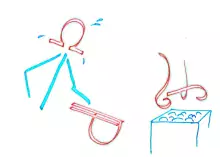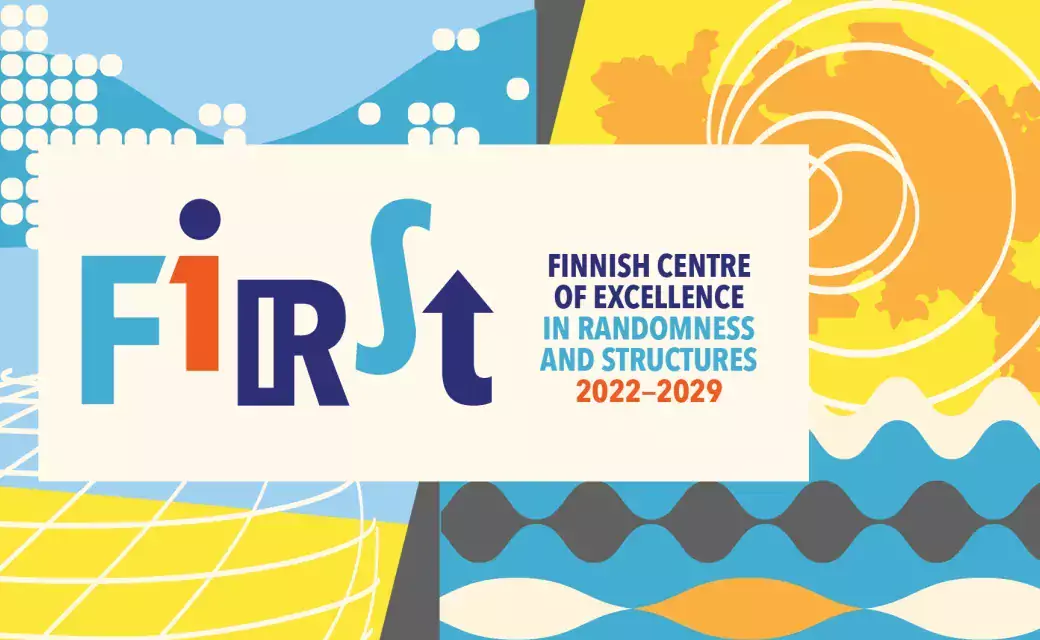Stochastic Sauna 2023
(1)
(2)
(3)
(4)
(5)
(6)
(7)
- Alexander Glazman
Title: Potts model at the transition point: continuity vs wetting
Abstract: The Potts model is defined on all possible colourings of vertices in q>1 possible values (q=2 corresponds to the Ising model). The distribution depends on the external parameter T>0 (temperature) and is given by the number of pairs of adjacent vertices having different colours. The agreements are favoured, but increasing temperature weakens the interactions.
It is classical that the model undergoes a phase transition: at low temperature, one of the colours forms an infinite connected component (order); at high temperature, all monochromatic components are finite (disorder). When q=2,3,4, we give a new proof of the continuity of the phase transition (joint work with Lammers): unique Gibbs measure, no spontaneous magnetisation. When q>4, we establish the wetting phenomenon (joint work with Dober and Ott): separation of two monochromatic phases by a disordered layer.
Our arguments rely on couplings between several models: random-cluster, six-vertex and Ashkin-Teller. At the core of the proof of the continuity is a delocalisation result that applies also to random Lipschitz functions (the loop O(2) model).
- Joona Oikarinen
Title: Gaussian multiplicative chaos and quantum field theories with exponential interactions
Abstract: I will explain what is Gaussian multiplicative chaos (GMC) and how it appears in the path integral formulation of two-dimensional Euclidean quantum field theories (EQFT) with exponential interactions.
We will focus on the Liouville EQFT and its perturbations, which include the Sinh--Gordon model. The Liouville model is scale invariant, and we consider a perturbation that breaks the scale invariance. Then, one expects to see interesting behaviour in the infinite volume limit. I will describe how the behaviour of these models in the infinite volume limit ties into some open questions in the theory of GMC.
- Juho Leppanen
Title: Rate of memory loss for non-autonomous dynamical systems with some hyperbolicity
Abstract: The notion of memory loss in the context of dynamical systems describes how measures evolving with the dynamic are attracted from each other. In a joint work with A. Korepanov (2021) we developed a coupling approach to analyze the rate of memory loss in non-uniformly expanding non-autonomous dynamical systems formed by sequential concatenation of measurable self-maps with "good" first return dynamics. In particular, we assumed an integrable upper bound on tail probabilities of the first return time uniformly with respect to the chosen sequence of maps. In work in progress (joint with A. Korepanov) we further expand our coupling approach to deal with non-uniformly decaying tails of first returns. As applications, we obtain new bounds on the rate of memory loss for non-iid random compositions of expanding interval maps with a neutral fixed point.
- Kalle Koskinen
Title: Infinite volume metastates of the vector-valued random field mean-field spherical model
Abstract: Recently, the infinite volume states and metastates of the real-valued random field mean-field spherical model were determined, and the model was shown to exhibit chaotic size dependence in both the infinite volume states and metastates. In this talk, we will consider the problem of the determination of the infinite volume states and metastates of the vector-valued generalization of this model. The structure of this models limiting states and metastates is significantly richer than the real-valued model. These models belong to the field of disordered systems, and the probabilistic methods used for them primarily involve high-dimensional random probability measures. This is a joint work with Christof Kuelske.
- Mikko Pakkanen
Title: Unifying incidence and prevalence under a time-varying general branching process
Abstract: In epidemiology, renewal equations are a popular approach used in modelling the number of new infections, i.e., incidence, in an outbreak. We develop a stochastic model of an outbreak based on a time-varying variant of the Crump-Mode-Jagers branching process. This model accommodates a time-varying reproduction number and a time-varying distribution for the generation interval. We then derive renewal-like integral equations for incidence, cumulative incidence and prevalence under this model. We also investigate some of the salient theoretical properties of these equations. Finally, we present a numerical discretisation scheme to solve the equations and use this scheme to estimate rates of transmission from serological prevalence of SARS-CoV-2 in the UK and historical incidence data on Influenza, Measles, SARS and Smallpox. Joint work with X. Miscouridou, M. J. Penn, C. Whittaker, T. Berah, S. Mishra, T. A. Mellan and S. Bhatt.
- Matija Vidmar
Title: Fock structure of complete Boolean algebra of type I factors
Abstract: The factorizable vectors of a complete Boolean algebra of type I factors, acting on a separable Hilbert space, are total, which resolves a conjecture of Araki and Woods. The spectral theory of noise-type Boolean algebras of Tsirelson is cast in the noncommutative language of “factorizations with unit” for which a muti-layered characterization of being “of Fock type” is provided.
- Stefano Pagliarani
Title: Degenerate McKean-Vlasov equations with singular drift
Abstract: We study a class of McKean-Vlasov stochastic differential equations (MKV SDEs) with degenerate diffusion, a kinetic Langevin-type model being a particular instance. The MKV interaction acts on the drift through the multiplication between the density of the solution and a distribution that belongs to suitable anisotropic Besov space. These equations can be understood as mean-field limits of particle systems with singular moderate interactions. We prove well-posedness for the non-linear singular martingale problem associated to the MKV SDE and obtain partial regularity results for the density of the time-marginals. The approach combines analytical and probabilistic tools. As a by-product, we obtain well-posedness and stability results for the relevant non-linear singular Fokker-Planck and singular Kolmogorov backward PDEs, and the well-posedness of the linear kinetic-type singular martingale problem. This is a joint work with Elena Issoglio, Francesco Russo and Davide Trevisani.
Wednesday
13:00--13:45 (including 5 min questions): Stefano Pagliarani
13:50--14:35 (including 5 min questions): Juho Leppanen
14:35--15:15 Coffee break
15:15--16:00 (including 5 min questions): Joona Oikarinen
16:05--16:50 (including 5 min questions): Mikko Pakkanen
18:00--20:00 Sauna
Thursday
10:00--10:45 (including 5 min questions): Kalle Koskinen
10:45--11:20 Coffee break
11:20--12:05 (including 5 min questions): Alexander Glazman
12:10--12:55 (including 5 min questions): Matija Vidmar
There is no participation fee, but registration is mandatory. Please fill in the
University of Helsinki, Kumpula Campus, Room D122 Exactum.
The lecture hall is equipped with a blackboard, beamer, and a computer.
The social program includes a
The entry for the sauna is offered by the centre of excellence FiRST. The dinner is payed by each participant (yourself). Sauna Allas Sea Pool at 18:00 on Wednesday 20th after the seminar. Bring your swimsuit.
The workshop is hosted by the Department of Mathematical and Statistical Sciences, University of Helsinki, and organized by
Dario Gasbarra,
Gerardo Barrera,
Nikolay Barashkov,

